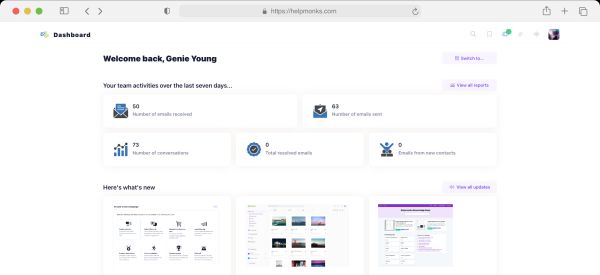
Introducing new pricing for Helpmonks
Discover Helpmonks' new pricing structure, featuring a flexible PRO plan, a FREE plan for smaller teams, and an exciting affiliate program. Experience unparalleled email management solutions today!
Read now91% of customers who have poor customer service experience leave without warning. One bad experience could lead to your company losing a customer. And, likely, you won't get another chance.
Your customer service department is more important than you may realize. These employees are the ones who deal with confused, concerned, and frustrated customers daily.
Your customer service team determines whether or not you keep customers.
So, you need exceptional customer service. If you want to learn how to create a good customer service experience, keep reading.
Excellent customer service means caring for your customers in several different ways. You have to follow the best customer service skills like these:
All in all, outstanding customer service exceeds customer expectations.
As we briefly discussed earlier, customers do not stick around after a bad customer service experience. Companies may not even have a chance to make a bad situation better. Likely, the company won't get another chance again.
You have to get ahead of your customer service approach. The better your strategy is now, the better your relationship with your customers will be in the long run.
Every detail matters. You have to have the right staff, the right approach, and exemplary follow-through.
In the long run, superior customer service will bring more value to your business, which means better relationships, more revenue, and a more positive reputation.
Creating an excellent customer service culture involves many areas. Let's start by looking at the components of an effective action plan to devise a successful customer service department.
First of all, you need to make sure that your customer service team is knowledgeable. If your team can't answer questions about your products/services, you'll turn away customers quickly.
All of your customer service associates should be knowledgeable about a variety of topics. If your department is large, you may have specialties within your customer service team. You might have employees specializing in technology, onboarding, offboarding, sales, or something else.
Whether you have a small or large customer service team, each member should know your company and each product/service well. Each employee should be able to answer basic questions about any product/service.
If your employees specialize in certain areas, you should have a system for dividing customer inquiries. The right questions should go to the right people. The faster this happens, the faster your customers will get their answers.
Your customer service professionals need to be some of the most positive employees you have. They should be able to turn a customer's day completely around.
Even when everything is going wrong, your employees should find a way to turn things towards the positive.
Their positive attitudes will rub off on your customers. A great attitude can change the outcome of a conversation. That means that an angry customer could become one of your most loyal customers through one positive conversation.
If you're communicating with a customer over chat, you shouldn't be afraid to use emojis and other expressive methods. It may be challenging to show a positive attitude with text alone.
Using expressive methods isn't unprofessional. It may come off a personable. In the best cases, it may put a customer at ease.

Sometimes, a problem requires a creative solution. In these cases, your customer service professionals need to come up with the answers quickly.
Each customer service employee should thrive every time they come up with a solution. It's the fundamental role of their primary job.
Considering that they're going to be solving problems every day, they should enjoy it. It should fuel their entire reason for working.
Passionate and intelligent employees can make all of the difference in your customers' experiences. In turn, these attitudes will do more to advance your company. The better these professionals can develop relationships with your customers; the more likely your company can make repeat sales.
The bottom line is that your customer service team needs to go above and beyond for your customers. If your customers notice that the employees are doing all they can, they're more likely to come back for more.
The faster you can deliver world-class customer service, the better. Your customers' time is valuable, no matter what the problem is.
If you feel that something will take a long time, you shouldn't keep them on the phone for a long time. Like you wouldn't want to be kept on the phone for an hour, neither do your customers. Offer to call them back when you resolve the issue.
After saying all of this, we should note that speed should never come at the cost of quality. When it comes down to it, the quality of the customer service matters more than the speed of the service.
Your customers would rather you permanently fix an issue in a day than temporarily fix a problem in five minutes.
You should be quick about coming up with solutions and making fixes. But, you should never compromise the quality of your work just to do things quickly.
Personalization will go a long way. Whether it's an email or a phone call, you need to make the customer service experience personal. 40% of customers agree that they want better service in this way.
Just by including their name in the greeting, you can go a long way with a customer. Your team needs to do all they can to make the customer feel like an individual rather than just another ticket number.
Likewise, the customer wants to feel like they're talking to a human. If the responses are robotic and unemotional, your customer isn't likely to enjoy the experience. Impersonal customer service leads to a negative experience, which could lead to the loss of a customer.
Your customer service team should know how to give a personal touch whenever they interact with a customer. Ask them how their day is going or if you know, wish them a happy birthday if it's coming up soon.
Small things can make a big difference. Writing the perfect email template can help your employees navigate personalization in customer service.
Surprisingly, customers love helping themselves. They prefer to help themselves than have help from customer support.
It sounds too good to be true, but it's the reality. By giving your customers online resources, you'll be able to reduce the volume of customers coming to your employees for answers. Plus, your customers will get the satisfaction of figuring everything out on their own.
Everyone wins.
We suggest building a knowledge database for your customers. For instance, create a frequently asked questions page on your website or with an entire knowledge base product, a full-fledged self-help center.
The time and money you spend building a knowledge base will make up for the time and money you would put towards traditional customer service.
As you're building your knowledge base, you should organize the database in a way that makes it easy for consumers to navigate. That's why category pages, search bars, and search engine optimization are an essential part of any knowledge base.
The easier you make it to find the information, the easier you'll make the customer service process. Both the customer and the employee will feel better with a knowledge base in place.

The entire customer service process should revolve around your customers. Their wants and needs are at the center of your entire business. That also means that they should be at the center of your customer support team.
How can you support your customers if you don't know, understand, and care about their wants and needs?
Your customers come before your products and profit, i.e., you should be more concerned with helping them than making a buck.
Building your customer service team around customer-centric ideas is going to benefit your business in the long run. The more your customers see that you care for them, the more they will care for your business.
Take the time to hire the right people and implement the right technologies. Recognize your customers as humans with emotions and expectations. Present yourself as a human with wants and desires.
Humanizing business practices like this is what will take your business to the next level. Today's customers want personalization at every level of business interaction. They want considerate human beings who will help them get through a tricky or confusing situation whenever it arises.
Active listening can go a long way. After all, you won't know the actual problem if you don't understand what the customer is talking about.
Listening includes real-time situations when you're talking to a customer and long-term conditions in which you're viewing analytics. You may see comments on social media or receive complaints online.
Listen to your customers when they're communicating with you. Whether they're complaining about you or praising you, you need to listen.
While you're listening, you should make sure to avoid voicing your comments or opinions. Don't assume what a customer is going to say. Don't complete their thoughts.
Let them air out their grievances and explain the whole situation.
To make the conversation run smoother, you should use phrases for confirmation. You may want to repeat what the customer tells you and ask if that is right. You could ask questions about the steps they've taken within your system.
Verifying this information is helpful for both parties. Your customers will feel that you're listening and understand their issues to solve their problems correctly.
If someone on your customer service team promises something, they need to see that promise through. Any promise that an employee makes is a promise that the entire company makes.
To develop a trustworthy reputation, you need to follow these promises through to fruition.
It comes down to respect for your customers and your customers' trust in you. It's a mutual give and takes for both sides. You give your customers quality, and they'll give you their business.
One of the most common issues has to do with timeliness. Often, customer service professionals will tell a customer that they'll get back to them within 24 hours. If you don't keep the promise and meet this expectation, you're likely to damage that relationship with the customer.
After saying all of this, we feel it necessary to say that you should overpromise. Don't make promises that you aren't sure that you can keep.
If anything, you can promise that you'll get back to the customer on your progress, which is better than promising that you'll resolve the issue. If anything, it's better if you end up fixing the problem faster than you said you would.
One of the best things that your employees can do is anticipate customer needs. Sometimes, you may identify something that your customers don't yet realize they want or need.
For example, you may notice that they're having trouble with one aspect of your product or service. If you can help your customer with one issue, you may be in a position to help them with another challenge.
By being proactive, you're going to make your customers feel more valued. They're going to feel like you're genuinely caring about their experience with your product or service.
In some situations, your team members should go the extra mile. Maybe your team could offer a coupon code, a gift, or a free service.
Small offers like these can help you build a solid relationship with your customers. They will feel more appreciated. In turn, you may receive more business from the customer.
At the very least, you will have contributed to a more positive reputation.

A large part of building a quality customer service team is finding individuals with superb customer service skills. Every customer service professional should have fifteen essential customer service skills.
These skills will streamline customer service operations for your business. Positive characteristics and personable personality traits are great things to have with your customer service team.
Let's walk through some of the most significant customer service traits.
Of course, your team members have to be able to listen to your customers. However, it's not enough to sit there and be quiet.
Your customer service team should be able to listen and repeat everything that a customer is saying. At the same time, your employees should be able to ask relevant questions to clarify confusing statements.
By restating comments and asking questions, your team members will present themselves as interested and concerned. Your customers will appreciate the sentiment.
Your employees should be able to communicate any idea. Even if the concept is complicated, your customer service team should know how to break it down.
It would be best if you remembered that your customers aren't experts. They may not understand terms that you think are basic.
Your team should know how to explain step-by-step instructions clearly.
Unfortunately, not all customer interactions are pleasant. Sometimes, both parties become frustrated.
That's why patience is such an extraordinary customer service skill. The more patient your staff is, the more likely they'll be able to solve customers' problems without any issues.
If your team becomes impatient, it could lead to a negative touchpoint. Remember: one bad situation could lead to you losing a loyal customer.
Problem-solving skills are more important than you may think. Not all questions have a straightforward answer.
Sometimes, your customer service professionals are going to need to develop answers for problems themselves. It's not always a matter of the wrong button or an incorrect password.
Look for customer service representatives who can solve more complicated issues independently. This essential customer service skill will make it easier for the customer and the company as a whole.
While they're solving problems, your customer service team needs to know how to use their resources. If they don't have the answer, they should know how to find it.
Of course, there may be some situations in which they need to pull in extra help. However, most circumstances should be simple enough to solve by themselves.
Even if it takes some digging, your employees should be able to handle most inquiries.
Emotional intelligence may seem unnecessary, but it can be helpful, especially when customers are silent about their feelings.
If a customer is holding in their emotions, the average individual may not catch it. However, someone with great emotional intelligence will be able to handle the situation better. They can sense tension and solve any frustration that the customer may have.
In line with emotional intelligence, your customer service representatives should have empathy. If your employees can put themselves in the customers' situations, they'll solve the problem adequately.
Maybe they'll know how to address the customer better. Perhaps they'll offer a freebie on top of the service.
Whatever it is, you'll find the empathetic customer service professionals always add a special touch. Even if it's just an extra smile or a 'how are you,' you'll find that customers will appreciate the special treatment.
Your customer service team should know how to persuade your customers. It may sound sneaky, but this isn't it at all.
When it comes to customer service, persuasion refers to keeping your customers calm rather than coercing them into something.
For example, your team may need to persuade customers to wait for them to solve a problem before requesting a refund.
Persuasion skills can deescalate intense situations while building strong customer relationships. As long as your team follows through with any promises they make, your customers will be agreeable.

Creativity is an exemplary customer service skill. Sometimes, your team members are going to have to think on their feet.
Without help or guidance, your customer service team may need to make creative solutions to problems they've never encountered. To the average human, this may sound scary. But, to the right person, it's an opportunity to grow.
Along with creativity comes flexibility. Your team member should be able to mold to any new situation that comes forward.
Your customer service representatives can't reject any of the inquiries that they receive. They have to be able to work on any and every question that comes to them.
Last but not least, your customer service team should be tenacious. No matter the circumstances, your team members should be motivated enough to continue with any problem that comes to them.
They shouldn't be discouraged by complex problems. Instead, they should find adventure, excitement, and passion through these more intricate tasks.
The more tenacious your team is, the more likely they are to find the answers to more complicated questions. Plus, they're going to find answers faster.
It's better for everyone.
The key to superior customer service is excellent customer service software. Every company needs software that supports its goals and needs. At the same time, the software needs to grow with the company and make employees' jobs easier.
Lucky for you, we've got just the thing at Helpmonks. Our live chat feature is everything that your customer service team needs. Your team members can communicate with customers through a shared inbox.
You'll find that your team will get through inquiries faster. At the same time, you'll be able to reach more potential customers.
If you're interested, get started today with a free trial of our customer-centric software.

Discover Helpmonks' new pricing structure, featuring a flexible PRO plan, a FREE plan for smaller teams, and an exciting affiliate program. Experience unparalleled email management solutions today!
Read now
Dynamic email signatures increase brand visibility, build brand identity, and boost conversions. Learn how to create and update dynamic email signatures.
Read now
Looking for an email marketing automation software? This guide shows what to look for. We'll also review the best tools for your online marketing needs.
Read now
Using customer engagement solutions helps you keep your existing customer base and grow. Here are the top 10 customer engagement solutions for your business.
Read now
Empower your team and delight your customers.
